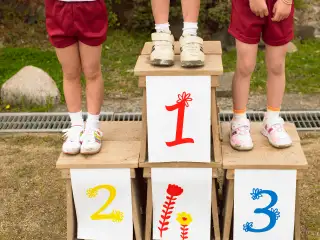Blame Your Brothers and Sisters for Making You Messed-Up About Money

This Sunday, April 10, is National Sibling Day. And whether you have fond or fraught memories of growing up together, how you relate to your siblings has a lot to do with how you manage your money.
Researchers have looked into the role birth order plays in a host of financial situations; you might be surprised at the extent to which being the oldest, middle, or youngest in the family affects how you spend, save, and invest.
While what follows aren’t hard-and-fast rules, social scientists say birth-order effect is the real deal. “Research overwhelmingly supports general differences in birth-order characteristics,” the authors of a meta-analysis of all the birth-order-personality research concluded. Here's what you can thank (or blame) your brothers and sisters for.
Saving money: Oldest children tend to be the most driven and motivated, which can make them more successful savers. Middle siblings are problem solvers who get along well with others—positive attributes in theory, but financial experts warn that their good nature means other family members can rely too heavily on middle children for financial assistance. Youngest children are often social butterflies, creative and less inclined to follow the rules, which can spell trouble for their finances if they aren't careful.
Risk tolerance: As you might expect, older siblings typically are more conservative and risk-averse with their finances. Such aversion can be helpful if it keeps you from loading up on credit card debt or living beyond your means. But it can also have a drawback. According to a study on birth order and financial risk tolerance, “first-born were less likely than the later-born to have a majority of their portfolios allocated in stock.” So even if older siblings are more diligent about saving their money than their younger brothers and sisters, an aversion to risk can keep their nest egg from growing as fast as it should.
Investment decisions: Firstborns can have another big money-management blind spot, according to a research paper focusing on the financial proclivities of oldest siblings. “Consistent with higher financial sophistication, firstborns gather more information when making financial decisions,” researchers noted. This is a good thing, but firstborn siblings are also strangely dismissive of that information after they gather it. The study’s authors continued, “But when they are optimistic, firstborns seem to act more on their bias in their portfolio choices. Firstborns also tend to engage more in stock picking.” For retail investors, this can be risky business, especially if you’re making investing decisions by going with your gut.
Career aspirations: A CareerBuilder.com survey found that only children were most likely to pull down six-figure salaries; among those with siblings, firstborns were most likely to have jobs that paid $100,000 or more. Middle children were the most likely to have entry-level jobs, and earn $35,000 or less a year.
Keeping up with the Joneses: This one is for those who had no siblings, or grew up separately from them. Only children have a unique trait in that they’re more likely than people with siblings to exhibit concern about where they “rank” compared with other people in their lives. That could, for instance, lead to overspending if people perceive acquisition as competitive. In a study, researchers wrote, “Only children and those who lived without their siblings have the strongest positional concern. Thus, birth order itself has less of an effect than whether one shared childhood with siblings.” Interestingly—perhaps because they have no siblings—only children brush off the effect of being an only child and think they’re not impacted by it, but the authors found that the reverse is true. “The results of this study show that they really are more affected by growing up without siblings than they think.”